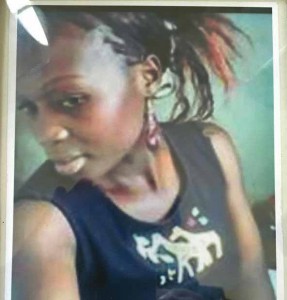
Photo of Garissa University College attack victim, Selpher Wandia, 21. (Morning Star News from Twitter)
(Morning Star News) – Islamic extremist violence in countries not known for religious tensions, majority-Christian Kenya and Uganda, topped Morning Star News’ stories in 2015. While the Islamic State terrorized Christians in Syria, Iraq and Libya, and Muslim Fulani herdsmen in Nigeria killed innocent civilians in the shadow of Boko Haram, in northeast Kenya Al Shabaab militants massacred Christian college students and others on a scale that few expected. At the same time, Morning Star News uncovered incessant attacks on Christians by ordinary Muslims in remote pockets of eastern Uganda, with some aid agencies verifying the reports as they considered assisting survivors.
1 – Massacre at College in Kenya
Kenya, in the worst attack on its soil since the 1998 bombing of the U.S. Embassy in Nairobi, suffered an attack on a college by Somalia’s rebel Al Shabaab on April 2 that killed 148 people, besides four assailants. With Christians selected out, 142 students, three security officers and three university security personnel were gunned down. The attack on Garissa University College in northeastern Kenya also wounded 104 people.
The gunmen first targeted a chapel service where Christians had gathered for prayer at 5 a.m., spraying them with bullets and killing 22. A female student and member of the East Africa Pentecostal Church (EAPC) lay in a pool of blood among the bodies, feigning death. “One terrorist picked up a call from a phone on a dead body close by, and he said that they were continuing to kill their children, and that they need to know that Garissa is for Muslims only,” Millicent Murugi said.
The Garissa attack caused greater loss of life than Al Shabaab’s assault on the Westgate Shopping Mall on Sept. 21, 2013, which killed at least 67 people, with dozens still unaccounted for. The assailants killed those they could identify as non-Muslims. The Garissa college attack not only elevated the scale of violence in Kenya, which has only an 8-percent Muslim population, but was also emblematic of an uptick in other attacks on Kenyan Christians by Islamic extremists from Somalia.
Representatives of Al Shabaab, which has ties to Al Qaeda, said the attacks came in retaliation for Kenya’s involvement in helping the Somali government fight the Al Shabaab insurgency. The rebels also oppose education for women. In 2011 Kenya joined African Union forces battling the Al Shabaab insurgents after a series of Somali attacks on tourists and other targets in northern Kenya, and since then Al Shabaab has carried out several retaliatory attacks on Kenyan soil.
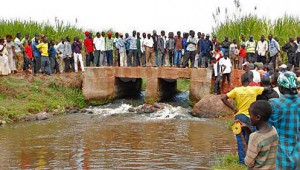
A crowd gathers where the body of a pastor was thrown into a river in eastern Uganda on Dec. 23, 2015. (Morning Star News)
2 – Islamist Violence in Eastern Uganda Uncovered
Numerous, isolated attacks on Christians by ordinary Muslims in remote, predominantly Muslim areas of eastern Uganda last year indicated a growing atmosphere of intolerance in 2015. As recently as Dec. 23, a pastor in eastern Uganda was hacked to death as he and other church members resisted an effort by Muslims to take over their land, area church leaders said. Pastor Bongo Martin, father to two children, died from blows from a sword from a group of Muslims trying to wrest land from his church in Nansololo village near Mazuba, in Namutumba District. He was 32.
In another area of eastern Uganda, five underground Christians in a predominantly Muslim village died from a pesticide put into their food after a Bible study, area sources said. The Bible study took place on Dec. 18 in Kachomo village, Kachomo Sub-County, Budaka District at the home of Hajii Suleiman Sajjabi, a convert from Islam who had begun the study with eight family members who had come to faith in Christ under his influence. Sajjabi was still receiving hospital care from after someone put a pesticide into the food the group ate after the study, and four of his relatives have died. A fifth person, neighbor Mariam Kurumu, a pregnant mother, died on Dec. 19 at Mbale Regional Hospital.
Budaka central police and Kaderuna police were searching for one of Sajjabi’s sons, 32-year-old Isa Sajjabi, who had opposed leaving Islam for Christianity and had distanced himself from his converted relatives. A doctor at Mbale Regional Hospital said a postmortem test showed a substance known as Malathion, a low-toxicity pesticide, in those who had died. Though low-level toxic, Malathion when ingested quickly metabolizes into highly toxic Tomalaoxon.
The attacks were the latest in a continual stream last year. Islamic extremists in eastern Uganda on Dec. 8 set a deadly trap for a Christian policeman who had left Islam. A Muslim in the Komodo area of Kadama Sub-County, Kibuku District, killed officer Ismail Kuloba after he responded to an urgent call to intervene in a supposed land dispute between warring parties. Kuloba was 43. One of about 20 Muslims gathered there, Mudangha Kasimu, allegedly threw a stone that hit Kuloba in the forehead. Kasimu then shot him twice in the head, and Kuloba died as other Muslims were shouting, ‘Allah Akbar [God is greater],’” sources said.
About 12 miles east in Kabuna, near Budaka in Kaderuna District, a group of Muslim men from Palissa on Dec. 9 kidnapped three children of Madengho Badir, a Christian convert from Islam. Badir, 42, arrived at his home in Kabuna Sub-County, Kabuna parish, find 5-year-old Nabukwasi Shakira, 7-year-old Gessa Amuza and 10-year-old Wagti Musitafa missing. An area source said a 14-year-old boy from Kabuna, Karami Hassan, was with Badir’s three children when they were abducted near their home. The boy said a group of Muslims from Palissa were looking for Badir, and the boy led them to Badir’s children.
Outside of Kabeshai, near Palissa, a Christian father of five who supported 10 children whose families had disowned them for leaving Islam was killed on Dec. 2. One of three men who attacked Patrick Ojangole reproached him for failing to heed a warning to cease his Christian activities before the Christian was killed, said a witness who was with Ojangole and escaped. Ojangole was 43.
On Nov. 12, the father of a young Muslim woman in east Uganda tried to beat her to death after she became a Christian, but community leaders intervened and limited him to disowning her, sources said. Kibida Muyemba learned that his 21-year-old daughter, Namusisi Birye, had put her faith in Christ at an evangelistic campaign held that day in Nandere village, Kadama Sub-County, Kibuku District, 41 kilometers (25 miles) west of Mbale. Birye and a man in the traditional dress of an imam confessed openly to receiving Christ, they said, and angry Muslims cut the event short.
On Oct. 19, Muslims in Kalampete village, Kibuku District who were angry at a Christian for leaving Islam killed his wife, a month after his brother was killed for the same reason. Mamwikomba Mwanika, mother of three adult children and five others ranging in age from 17 to 9, died en route to a hospital after Muslims unknown to her dragged her from her home at about 9 p.m. and assaulted her, survivors said.
Her husband’s brother, Samson Nfunyeku, was killed in the village on Sept. 23 after flaring tempers cut short a religious debate he’d had with Islamic scholars.
In Nsinze village, Namutumba District, a Muslim beat and left for dead his wife and 18-year-old son on Aug. 11 after learning they had converted to Christianity, area sources said. Issa Kasoono beat and strangled his wife, Jafalan Kadondi, but she survived, said a source who requested anonymity. He said other relatives joined Kasoono in beating her and their two sons, Ibrahim Kasoono, 18, and Ismael Feruza, 16, though the younger son managed to escape with only bruises on his arm.
The wife of a former sheikh was poisoned to death on June 17 after she and her husband put their faith in Christ in Nabuli village, Kibuku District. Namumbeiza Swabura was the mother of 11 children, including a 5-month-old baby. In Kiryolo, Kaderuna Sub-County, Budaka District on March 28, five Muslims gang-raped the 17-year-old daughter of a pastor because the church leader ignored their warnings that he stop worship services, she said.
About 85 percent of the people in Uganda are Christian and 11 percent Muslim, with some eastern areas having large Muslim populations. The country’s constitution and other laws provide for religious freedom, including the right to propagate one’s faith and convert from one faith to another.
3 – Christians in Syria Suffer Islamic State Atrocities
Christians suffered execution, rape, kidnapping and second-class Dhimma status in Syria, where the Islamic State (IS) continued to carve out a caliphate in the vacuum created by nearly five years of civil war. In September, IS killed three Assyrian Christians, according to an execution video released on Oct. 7. In the video, the group threatened to kill some 200 other Christians in Syria unless it received a ransom of $50,000 each for their release.
The three men killed were part of a group of at least 250 Assyrians abducted by IS in February, when the group pushed though the Khabur River Valley in Hassakah Province and attacked dozens of Assyrian villages. Groups of hostages were released intermittently throughout the year, and 130 remain. IS also released a video about the “submission tax” imposed on Christians in the town of Al-Qaryatayn, which it attacked on Aug. 5.
At least 700,000 of Syria’s pre-war population of 1.4 million Christians have fled in the face of the maltreatment and other war horrors. Among various reports of atrocities against Christians, difficult to confirm, was one by Christian Aid Mission, which assists indigenous Christian workers in their native countries. In an unnamed village near Aleppo, IS militants on Aug. 28 crucified four Christians, including a 12-year-old boy, and beheaded eight others in separate executions, Christian Aid reported. The boy was the son of a Syrian ministry team leader who had planted nine churches. All were killed for refusing to return to Islam after embracing Christianity.
All Syrians are suffering in the war that broke out in 2011, but Christians are exposed to greater risks because of their outsider status within Syria, according to human rights activists.
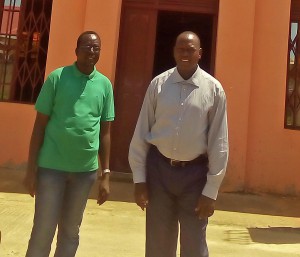
The Rev. Yat Michael (R) and the Rev. Peter Yein Reith (L) after church service in Hai Jebel in Juba. (Morning Star News)
4 – Wrongly Arrested Pastors Freed in Sudan
Two South Sudanese pastors arrived home to Juba on Aug. 19 from Khartoum, Sudan after an eight-month ordeal of imprisonment, fabricated charges of capital crimes and a ban on leaving the country. The Rev. Peter Yein Reith and the Rev. Yat Michael were acquitted of the crimes calling for the death penalty on Aug. 5 but were prevented from boarding a plane out of the country the next day. Sudan’s notorious National Intelligence and Security Services (NISS) had ordered the travel ban when they were initially detained and gave the orders to the airport personnel.
An international outcry erupted over their initial, weeks-long incarceration without charges after Morning Star News on Dec. 28, 2014 broke the news of Michael’s arrest, and on Jan. 20 published the first account of Reith’s arrest. Leaders in the South Sudan Presbyterian Evangelical Church (SSPEC), Reith and Michael were convicted of lesser charges and released on the time they had served. Reith was convicted under Article 65 of “establishing or participating in a criminal organization,” while Michael was convicted under Article 69 of “disturbing public peace.”
The pastors had also been charged with spying (Article 53), punishable by death, life imprisonment or prison and confiscation of property; undermining the constitutional system (Article 50), punishable by death, life imprisonment, or imprisonment and confiscation of property; disclosure and obtaining information and official documents (Article 55), punishable by two years in prison or a fine; blasphemy/insulting religious creeds (Article 125), punishable by one year of imprisonment or a fine or no more than 40 lashes; and joint acts in execution of a criminal conspiracy (Article 21).
Agents from NISS, said to be manned by hard-line Islamists, arrested the pastors. Michael, 49, was arrested after encouraging Khartoum Bahri Evangelical Church; the church was the subject of government harassment, arrests and demolition of part of its worship center as Muslim investors have tried to take it over. Reith, 36, was arrested on Jan. 11 after submitting a letter from SSPEC leaders inquiring about the whereabouts of Michael.
Due to its treatment of Christians and other human rights violations, Sudan has been designated a Country of Particular Concern by the U.S. State Department since 1999, and the U.S. Commission on International Religious Freedom recommended the country remain on the list in its 2015 report.
5 – Islamic State Executions in Libya
The Islamic State (IS) made its presence known in Libya in 2015 in gruesome execution videos of Egyptian and Ethiopian Christians. In a video released April 19 showing the cruel execution of 28 Ethiopian Christians, IS said persecution of Christians was fundamental to Islam. The speaker warned that if Christians in the Middle East and elsewhere refused Islam, they also would be slain. He gave Christians three options – convert to Islam, submit to the rule of Islam and pay the Jizya (tribute) or be killed.
The video came more than two months after IS released a video of the execution of 21 Christians, all but one of them Egyptian, on Feb. 15. The Ethiopians and the Egyptians who were executed on the beach appear to be executed in the same general area. In the April 19 video, the speaker quoted numerous religious edicts issued in consensus by Islamic scholars regarding the treatment of Christians and Jews.
“Whoever does not consider the Jews and Christians to be disbelievers and does not hate them is not a Muslim,” he said, quoting Islamic scholar Al Islam Ibn-Taymiyyah. Citing a Hadith (saying or action of Muhammad), he added that Muhammad told his followers to be aggressive toward Christians and Jews, declaring, “If you meet Jews or Christians, do not great them in peace.”
6 – Asia Bibi Execution Temporarily Suspended in Pakistan
Pakistan’s Supreme Court on July 22 agreed to review the case of Aasiya Noreen, commonly known as Asia Bibi, temporarily suspending the Christian mother’s execution after she was sentenced to death on a blasphemy charge. She was the first woman to be sentenced to death for blasphemy in Pakistan.
Arrested in June 2009 after Muslim co-workers in a berry field 60 miles west of Lahore beat her when she refused to convert to Islam following a quarrel, her death sentence was announced in November 2010. She was convicted under Section 295-C of the defamation statutes for alleged derogatory comments about Muhammad. The Lahore High Court on Oct. 16, 2014 upheld the death sentence for the mother of two children and stepmother to three others.
Attorney Saif-ul-Malook told Morning Star News that he had a strong case for demanding Noreen’s acquittal, as the First Information Report (FIR) against her was registered five days after the alleged remarks. In a previous blasphemy case, Ayub Masih v. State in 2002, judges had thrown out a death sentence due to a delay in the registration of the FIR of just three hours. The main complainant against Noreen, Muslim cleric Mohammad Salaam, admitted that he had not heard her blaspheme but only heard an alleged confession. Noreen’s other main accuser, the owner of the field where she worked, Muhammad Imran, was not present at the time of her quarrel with co-workers, either; he was away from the village at the time.
Noreen’s case focused international attention on how Pakistan’s blasphemy laws have become a weapon against religious minorities. Her death sentence led to international protests, and the possibility of overturning it provoked outrage within Pakistan. Punjab Gov. Salman Taseer was slain by his bodyguard on Jan. 4, 2011 because of his support for Noreen and his criticism of the blasphemy law; the bodyguard believed Taseer, a Muslim, had blasphemed by criticizing the law.
Meeting with Noreen after her sentencing in 2010, Taseer had told her he believed the charges against her were fabricated and promised to recommend a presidential pardon. He called Pakistan’s blasphemy statutes “a black law” and called for their repeal.
Former Minister for Minority Affairs Shahbaz Bhatti, the first Christian, cabinet-level minister, was shot and killed on March 2, 2011 for calling for reforms to blasphemy laws following Noreen’s trial. Death sentences have not been carried out in blasphemy cases, but that is in part because such allegations have frequently led to deadly vigilante attacks on the accused or their lawyers.
Pakistan is nearly 96 percent Muslim, according to Operation World, and religiously charged court cases commonly involve clamoring crowds of Muslims and other pressures coming to bear on lawyers and judges. Christians make up 2.45 percent of the population.
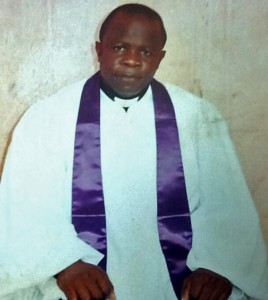
The Rev. Caleb Ahema, president of the Christian Reformed Church of Christ in Nigeria. (Morning Star News)
7 – Jihadist Motives of Muslim Herdsmen Cited in Nigeria
Christian leaders cited the killing of Christians by Muslim Fulani herdsmen in Nigeria’s middle belt as part of a jihadist drive to take over resources and displace the historically Christian population. In some cases, particularly in southern Kaduna state, the herdsmen were working in concert with Islamic extremist groups, area residents said. The Aug. 22 killing of brothers Ushahemba Kumashenge and Sughter Kumashenge in Kortse village, Gassol Local Government Area of Taraba state was one of numerous attacks there and in Kaduna, Nasarawa and Benue states in 2015. The Rev. Caleb Ahema, president of the Christian Reformed Church of Nigeria (CRCN), described the attacks as a planned genocide against Christians.
Asserting that no authority has shown any interest in the attacks on Christians in southern Kaduna state that began to accelerate in 2011, Danjuma La’ah, a senator for southern Kaduna in Nigeria’s National Assembly, demanded the new federal government of Muhammadu Buhari take immediate action. “The manner in which our people are being killed with impunity still resembles the same fashion of mindless murder of our people under the former government,” La’ah said. “We are asking that the federal government should make southern Kaduna one of the areas that need urgent and immediate security response, just like it is doing in parts of Northeast zone.”
The middle belt states of Kaduna, Taraba, Benue and Nasarawa are comparatively rich in environmental resources that have drawn migration by herdsmen and other Muslims, according to a report last year by the Nigeria Conflict Security Analysis Network (NCSAN) for Christian support group Open Doors. Comparing violence in those areas with that of Islamic extremist group Boko Haram in the northeast, NCSAN reported that attacks in the middle belt states were based not only on pursuit of environmental resources but were “intrinsically inspired by radical Islamic ideology, both as purported by the expansionist principle of darul [house of] Islam and by Boko Haram. It is a principle that divides the world into Islamic and non-Islamic, and the obligation to ensure that the non-Islamic world is brought under Islamic rule.”
Two displaced persons from Gwnatu, Kaduna state, said Fulani Muslim herdsmen were using conflict over environmental resources to carry out an Islamic agenda of killing Christians and trying to intimidate survivors into recanting Christianity in favor of Islam, according to the report, “Migration and Violent Conflict in Divided Societies: Non-Boko Haram violence against Christians in the Middle Belt region of Nigeria.”
“One of the men, who lost his two children in the violent conflict, blamed the Nigerian state for turning a blind eye to the excesses of Hausa-Fulani Muslim herdsmen migrating to the Middle Belt region,” NCSAN reported. “He wondered why the Fulanis are allowed to possess sophisticated weapons, with no law making such action illegal, while other ethnic nationalities are constantly harassed and arrested by security operatives for possessing similar weapons. According to him, this attitude of the security operatives can only be seen as supporting the impunity of the Hausa-Fulani Muslim nomads.”
The overwhelming number of victims in what mainstream media commonly describe as property disputes between Christian and Muslim ethnic tribes are Christian, according to the report. In Taraba state, 70 percent of the victims of non-Boko Haram violence were Christian and 7 percent Muslim; in Benue state, 88 percent of the victims of non-Boko Haram violence were Christian and 2 percent Muslim, according to the report. In Nasarawa state, the figures were 75 percent Christian and 15 percent Muslim.
John Danfulani, a Christian leader from southern Kaduna state, said that since 2011 Muslim Fulani attacks have killed 614 Christians in the region, wounded about 1,200 others and destroyed 1,000 Christian-owned houses. Christians in southern Kaduna “are being wiped out with impunity, and the casualty figures increase with every attack,” Danfulani said. “Everything points to the fact that our people are being used as sacrificial lambs.”
8 – Pakistan Church Bombings
Deadly gun-and-bomb attacks on two churches in Lahore, Pakistan on March 15 and the subsequent killing of two Muslims inflamed tensions. At least 17 people, including two policemen, succumbed to their injuries from the suicide attacks in Lahore’s Youhanabad area, which targeted Christ Church Youhanabad and St. John’s Catholic Church during Sunday Mass. Christians on March 16 filled roads to protest against the attacks, and one Christian youth was killed and 15 others were wounded in Lahore as violent protests spread from Youhanabad to other parts of the country.
At least two young suicide attackers blew themselves up – one at each church building – just when services were ending. Both attacks were foiled by Christian security volunteers, who laid down their lives to protect the 2,000 people worshipping at the two churches. The attacks, which took place almost five minutes apart, killed 16 people, including two policemen deployed for church security, and the next day a wounded Christian died at a hospital, raising the number of dead to 17. Immediately claiming responsibility for the attacks was the Jamaatul Ahrar, a Taliban terrorist group.
The two Muslims killed were snatched from police custody, tortured and their bodies torched on the street. Police later confirmed that one of the slain men, local glass-cutter Muhammad Naeem, had no connection with the bombings.
On March 16, thousands of Christians again went onto the roads in Youhanabad and in other cities of the country, including Faisalabad, Gujranwala, Sialkot and Multan, to protest the attacks; they blamed local police for negligence and deliberately deploying few officers in the impoverished Christian colony of about 100,000 people.
Pakistan Interfaith League Chairman Sajid Ishaq said it was unfortunate that Christian youths had succumbed to violent retaliation.
“Christianity preaches love and tolerance – while we cannot ignore the lapses in governance and the attitude of the ruling party towards non-Muslims, our youths should have exercised restraint and registered their protest peacefully,” he said. “Killing two innocent people to exact revenge is unacceptable … this has caused great loss to the entire community.”
9 – China Cracks Down on Human Rights Attorneys, Activists
Authorities in China arrested and harassed human rights lawyers and activists who were defending churches. A Christian activist writing against harassment of churches in China’s Zhejiang Province was temporarily detained and threatened in November, and an attorney representing some of the fellowships remained missing. The detentions were the latest signs of a government crackdown on at least 230 human rights lawyers and activists since July.
China’s National Security Bureau on Nov. 3 raided the home of writer Zan Aizong, a Christian who had been blogging on violations of religious freedom and the destruction of crosses on church buildings in Zhejiang Province that officials have undertaken since 2014, according to the South China Morning Post. Authorities accused Zan of inciting subversion of national security, and they threatened and intimidated him before he was released.
At the same time, a Christian attorney for churches in Zhejiang, Zhang Kai, has not been seen since Aug. 25, according to the Religious Liberty Prayer Bulletin (RLPB). Chinese security forces seized Zhang in Wenzhou on Aug. 25, along with assistant Liu Peng and several area pastors. Zhang, 37, had taken up residence in a Wenzhou church building for a year in order to help the legal cases of area fellowships whose church buildings or crosses had been destroyed. Officials cited church violations of zoning rules, while pastors and advocates asserted that the government only sought to diminish the churches’ effectiveness.
Yang Xinquan, Zhang’s employer, told The New York Times that police and Christian sources indicated that Zhang could be held in secretive detention for six months, charged with threatening state security and “assembling a crowd to disrupt social order.” Yang said Zhang was advising a church in Wenzhou when police took him away, and that assistant Liu and another legal worker, Fang Xiangui, were also likely being held in secret in Wenzhou, according to the Times.
Zhang is one of an estimated 230 lawyers and activists that have been detained, with 26 still being held, according to Amnesty International. He was first detained in Wenzhou by state security police late at night on July 10, according to Hong Kong-based Initium Media. Following his release after a night of interrogation, Zhang later told an Initium reporter that public security officials warned him to stop working on church cases and holding legal seminars.
Advocates fear for Zhang’s health and safety. Prominent human rights attorney Gao Zhisheng was released on Aug. 7, 2014, after months of isolation and torture left him physically disabled and unable to speak coherently.
Zhang had represented Pastor Huang Yizi of Salvation Church in Wenzhou. Supporters put up resistance to a government attempt to remove the church’s cross in 2014 that resulted in injuries, and Pastor Huang was ultimately sentenced to jail for “gathering a crowd to disturb social order,” Initium reported.
Identifying and documenting various procedural illegalities in the way the government harassed the Wenzhou churches, Zhang left government officials enraged and legally defeated, according to Initium. Authorities offered to free the then yet to be prosecuted Pastor Huang if Zhang would cease representing him, but when Zhang recused himself, officials reneged and sentenced the pastor to a year in prison, Initium reported.
Zhang organized a group of 30 attorneys from throughout China to take up church cases in Zhejiang Province. He also wrote a number of articles and Web posts. Initium reported Zhang saying, “Lawyers can’t necessarily prevent the crosses being removed, but at least they can expose the illegal nature of the exercise. Even if they were constructed against regulations, there should be a reasonable and legal process to remove them. Otherwise, where’s the legality?”
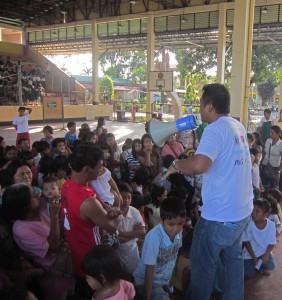
Children caught in armed conflict are entertained at an evacuation center in Mindanao. (Morning Star News)
10 – Islamic Sub-State Proposed in the Philippines
Christians and others in the southern Philippines expressed strong fears that legislation creating an Islamic sub-state on Mindanao Island will exacerbate religious tensions rather than resolve them. The Bangsamoro Basic Law (BBL), proposed by President Benigno Aquino III with the aim of ending decades of Islamist rebel violence in Mindanao, was approved by a House Ad Hoc Committee on May 20 with 50 members voting yes, 17 voting no and one abstaining. The area, comprising five provinces with sizeable non-Muslim populations, already enjoys a measure of autonomy as the Autonomous Region of Muslim Mindanao (ARMM), and the proposed BBL would give leaders sufficient independence to impose sharia (Islamic law).
If Bangsamoro, or “Moro Country” with Moro being colloquial for “Muslim,” were ruled under sharia, non-Muslims would become second-class citizens with drastically reduced rights. Critics of the bill say it would render the federal government powerless to redress human rights abuses under Islamic law.
Rolly Pelinggon, national convener of Mindanaoans for Mindanao (M4M), told Morning Star News that the BBL would worsen Muslim-Christian conflict. Besides intensifying religious-cultural differences between Christians and Muslims, the BBL would also facilitate monopoly of oil and gas resources by vested groups in Mindanao, he said. The BBL came about as part of a preliminary peace accord, the Bangsamoro Peace Framework Agreement (BPFA), between the Aquino administration and the Moro Islamic Liberation Front (MILF) rebel group, but it has done little to reduce violence. The BPFA was signed in 2013 as a precursor to a final peace agreement. The government claimed there would be no more Muslim rebel attacks in Mindanao after it was signed, but in some areas violence has increased.
Zamboanga City Mayor Maria Isabella Climaco has announced that Zamboanga will never be part of the BBL and is one of the country’s staunchest critics of the legislation. In Cotabato, indigenous tribal leader and village chieftain Jojo Sibug also told Morning Star News the BBL would aggravate religious conflict in Mindanao. Noting that the first inhabitants of Mindanao were the Manobo and other indigenous tribes, Sibug denied Islamic claims to the region.
The fate of the BBL lies in the hands of the country’s 24 senators deliberating the bill. A March poll found that 44 percent of people in the Philippines opposed the bill, and 22 percent supported it. In Mindanao, 62 percent of those surveyed opposed the bill. Davao City Mayor Rodrigue Duterte said the BBL could increase chances of Christians getting caught between the Moro National Liberation Front and the MILF, who are fighting each other.
If you would like to help persecuted Christians, visit https://morningstarnews.org/resources/aid-agencies/ for a list of organizations that can orient you on how to get involved.
If you or your organization would like to help enable Morning Star News to continue raising awareness of persecuted Christians worldwide with original-content reporting, please consider collaborating at https://morningstarnews.org/donate/?
###
© 2016 Morning Star News. Articles/photos may be reprinted with credit to Morning Star News.
Morning Star News is a 501(c)(3) non-profit corporation that relies solely on contributions to offer original news reports of persecuted Christians. By providing reliable news on the suffering church, Morning Star News’ mission is to empower those in the free world to help and to encourage persecuted Christians that they are not forgotten or alone. For free subscription or to make tax-deductible donations, contact [email protected], or send check to Morning Star News, 34281 Doheny Park Rd., # 7022, Capistrano Beach, CA 92624, USA.
- Photo of Garissa University College attack victim, Selpher Wandia, 21. (Morning Star News from Twitter)
- Islamic State member gives Dhimma (second-class) contracts for Christians to sign. (Islamic State)
- A crowd gathers where the body of a pastor was thrown into a river in eastern Uganda on Dec. 23, 2015. (Morning Star News)
- The Rev. Yat Michael (R) and the Rev. Peter Yein Reith (L) after church service in Hai Jebel in Juba. (Morning Star News)
- Islamic State executioner in Libya addresses viewers in video. (Screen-save Morning Star News)
- Muslims in Pakistan clamor for Asia Bibi’s death sentence to be upheld in 2010. (Pakistan Today)
- The Rev. Caleb Ahema, president of the Christian Reformed Church of Christ in Nigeria. (Morning Star News)
- LAHORE: Christian mourns after death of her relative following suicide bombing attacks on churches. INP PHOTO by Hamid Moosa
- Christian women mourn a dead relative after church bombings in Lahore. (M. Ali)
- Zan Aizong. (Facebook)
- Children caught in armed conflict are entertained at an evacuation center in Mindanao. (Morning Star News)
- Christian women mourn a dead relative in Pakistan (M. Ali)
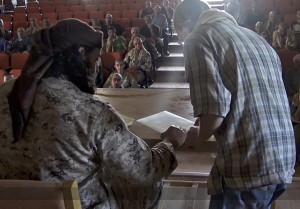
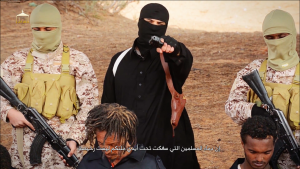
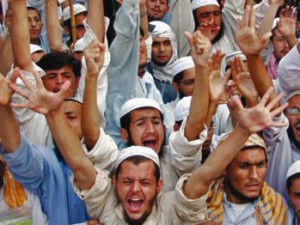
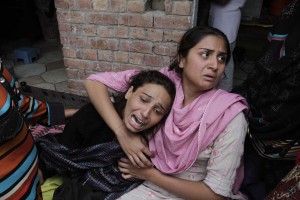
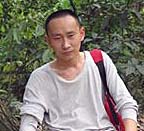


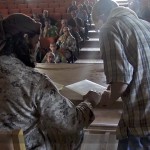
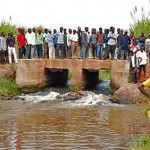

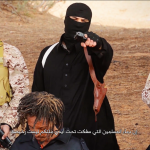
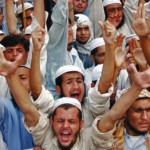

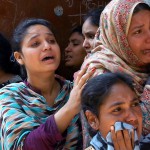
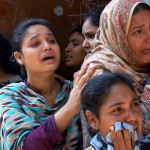

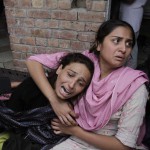
Speak Your Mind